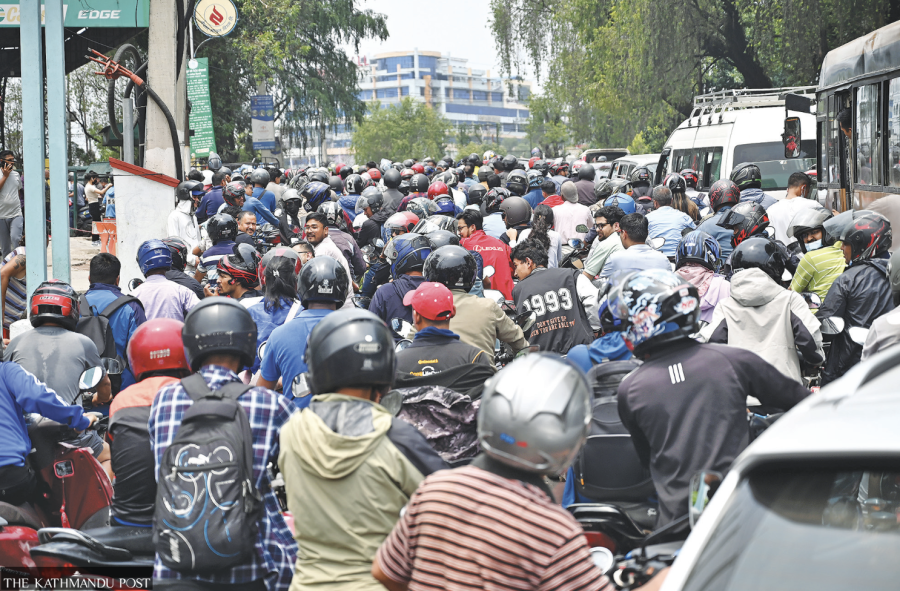Money
Fuel crisis sparks chaos in Valley, resolved by late afternoon
Petroleum workers abruptly stopped supplying to private fuel stations demanding social security coverage and minimum wages.
Krishana Prasain
On Monday morning, long queues snaked out of various state-run petrol stations across the Kathmandu Valley, causing frustration and long waits for motorists.
This was for the first time in years that the Kathmandu Valley was seeing motorist queues.
The situation arose due to a protest launched by petroleum transport workers who stopped supplying fuel to private pumps. They were protesting against their employers—petroleum dealers—accusing them of not implementing the minimum wage for workers as fixed by the government and excluding them from the social safety net. According to petroleum workers, petroleum transportation is one of the most dangerous jobs, yet lacks a social safety net.
The protest, which began Friday, took a nasty turn after private petrol pumps ran out of fuel on Monday.
Frantic motorists then started queuing up at state-owned petrol pumps. Videos and photos immediately went viral on social media, showing never-ending lines in front of petrol stations owned by Nepal Police in Naxal and other fuel stations.
“We’ve been waiting for an hour,” said Saroj Karki, whose motorbike was already running empty.
“This is totally frustrating. How can the government be so irresponsible,” said Karki, who was waiting at the Bhadrakali petrol pump run by the Nepal Army on Monday afternoon.
Karki, a sales manager for a private company, said that he was scheduled to attend two meetings in different places. “It's 12:30, and the queue hasn’t moved at all. I don’t know what to do.”
However, the streets of the Valley saw less traffic pressure on Monday due to a public holiday.
Since Friday, most private petrol pumps have hung up “no petrol” signs. The issue was resolved late Monday afternoon after the government decided to form a committee to address the grievances of the petroleum transport workers.
There are more than 2,100 petroleum transport workers in the country.
People also expressed frustrations on social media.
“One thing I like about the proliferation of electric vehicles in Nepal is that we will not be held ransom by different cartels of labour, transporters, fuel station owners and an inefficient, corrupt, constantly No Oil Corporation (NOC)!” Sujeev Shakya wrote on X.
Ajay Das posted a video on X showing a long queue of motorists. He wrote, “This is not Kathmandu traffic, it’s the queue at Naxal Police petrol pump this morning.”
On August 18 last year, the Ministry of Labour, Employment and Social Security implemented the monthly wage of workers, except for tea estate workers, at Rs17,300 as per Section 106 of the Labour Act, 2017.
The monthly basic salary has been fixed at Rs10,820, and the dearness allowance at Rs6,480. The daily wage has been fixed at Rs668 and Rs89 per hour. Similarly, the hourly wage for part-time workers has been fixed at Rs95 per hour.
But the petroleum transport workers said they have not received the hiked monthly wages and allowances.
“We tried to settle the issue on Sunday morning but were not successful,” said Manoj Kumar Thakur, deputy director of Nepal Oil Corporation, the state-owned oil monopoly.
The Kathmandu Valley consumes 700 kiloliters of petrol and 800 kiloliters of diesel daily. This requires 75-100 petroleum tankers to supply petrol and diesel from Thankot depo to different pumps in the Valley.
On Saturday, the oil supplier reduced the prices of petroleum products. Petrol price was cut by Rs3 per litre to Rs165 per litre, while diesel and kerosene became cheaper by Re1 each, to Rs152 per litre.
“Despite the monthly minimum salary of Rs17,300 determined by the Labour Act, we are receiving Rs8,000 to Rs10,000 per month. Only a few get Rs15,000, and that’s too below the government-set wages,” said Ishwar Lama, president of Nepal Petroleum Tank Divers Association.
“We have not even been included in the social security scheme,” Lama said. “We are hopeful that our demand will be addressed this time, or else we will launch a nationwide protest.”
According to the Nepal Oil Corporation, petroleum transport drivers stopped unloading fuel, petrol, and diesel from the corporation's Thankot depot on Sunday morning. The depot is open from 9 am to 5 pm.
Lama said that during a meeting held at the Ministry of Industry, Commerce and Supplies, they agreed to the government’s proposal to form a committee to address the issues raised by the workers. The committee has been given 15 days to submit the report. The petroleum transport workers have put forth a seven-point demand.
The committee is led by the deputy managing director of Nepal Oil Corporation with representatives from the Industry Ministry, Nepal Petroleum Tanker Drivers Association, Nepal Transportation Workers Association and All Nepal Petroleum Workers’ Union.
Lilendra Pradhan, president of Nepal Petroleum Dealers National Association, said that petroleum tanker drivers have not been included in the social security scheme as they have been compelled to work without appointment letters.
Thakur of Nepal Oil Corporation alleged that petroleum dealers were not providing salaries and benefits to petroleum transport workers, and they were not even included in social safety schemes.
“As petroleum dealers are appointed by the corporation, we have to play the role of facilitator to resolve the issue.”
On June 11, the Nepal Petroleum Tank Drivers Association had issued an ultimatum to the Nepal Oil Corporation.
As part of the protest, petroleum transport workers began protesting on Friday by wearing black bands around their arms.
The tank drivers' association has demanded that all drivers be provided appointment letters as per the Labour Act and salaries as determined by the government.




 13.12°C Kathmandu
13.12°C Kathmandu













